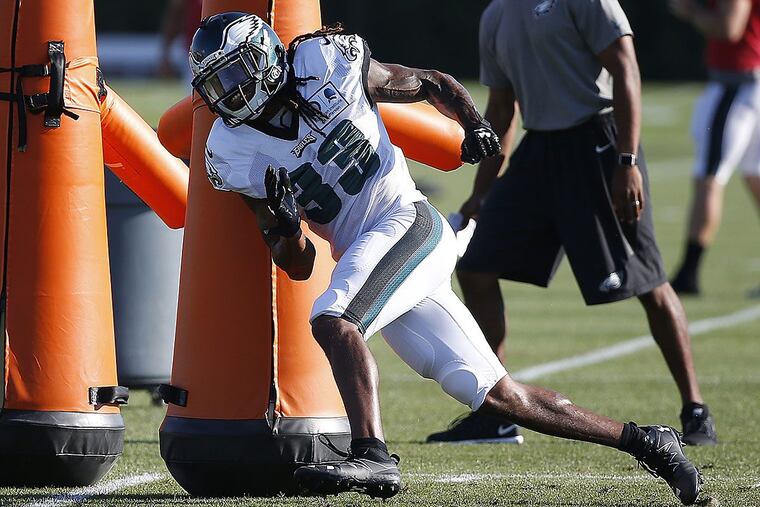Ron Brooks is back where the Eagles need him | Marcus Hayes
The Eagles defense was riding high until nickel cornerback Ron Brooks ruptured his right quadriceps against the Vikings. Without him, the defense and the team never really recovered.

When Ron Brooks collapsed, so did the Eagles.
Ron Brooks, the nickel cornerback? The 12th man on the defensive depth chart? The free-agent afterthought who had started only three games in his first four seasons?
Yes. That Ron Brooks.
That might sound overblown, considering the other issues that sabotaged the Eagles' 2016 season. Lane Johnson, the $56 million right tackle, was suspended for 10 games. Fletcher Cox, the $102 million defensive tackle, stagnated. Vinny Curry and Connor Barwin, whose contracts totaled more than $72 million, combined for just 7.5 sacks. So, yes, there were other factors.
But before Brooks got hurt, the team had ridden its defense to a 4-2 start, in large part because safeties Malcolm Jenkins and newcomer Rodney McLeod were playing at an elite level. After Brooks got hurt, Jenkins had to replace him at nickel corner. That hamstrung the defense. The team went 3-7 and dropped out of playoff contention.
"Leading up to that point, Malcolm and Rodney McLeod were having a really good start to the season," head coach Doug Pederson said. "It's a lot like [losing] Lane Johnson on offense. It disrupts several positions."
To be clear: Pederson isn't comparing Brooks' ability to Johnson's. Rather, Pederson is saying that every position on an NFL roster needs depth. Brooks' absence weakened the safety position, which had been the defense's greatest strength. The team never recovered.
Brooks might be just as important this season. The Eagles cut bait with 2016 starters Leodis McKelvin and Nolan Carroll, but replacement starters Patrick Robinson and Jalen Mills look even worse. They're still better than backups C.J. Smith, an undrafted free agent last season; Rasul Douglas, a third-round rookie; and Aaron Grymes, a former CFL star.
"Getting Ron back gives us that much more experience, depth and room to play around with whoever our best five DBs are that week," Jenkins said.
Brooks clearly was one of the best five last season. The numbers don't lie.
Brooks ruptured his right quadriceps tendon in Game 6. The Eagles defense finished that game ranked fifth in total yards (307.0), fifth against the pass (204.3) and third in points allowed (14.7). It had surrendered more than 24 points only once.
From games 7 through 15, the defense allowed 45 more total yards per game, 40 of them passing yards, which dropped it to 18th in both categories. It allowed almost a full touchdown more, which dropped it to 14th. It gave up more than 24 points in seven of those nine games. Jekyll turned into a very ugly Hyde.
In those games, Jaylen Watkins filled the vacuum at safety left by Jenkins. Mills played more cornerback. The chemistry was ruined. The opposition feasted.
"When you work at a rotation all summer long, the preseason and six games into the season, one guy getting hurt throws things out of whack," Brooks said. "It takes people away from doing what they're great at doing."
Part of Jenkins' greatness lies in his versatility, but that versatility diminishes when he leaves his primary position.
"The loss of Ron showed our lack of experience in that spot," Jenkins said. "I played nickel more than we wanted to. Ron is an experienced player at the nickel spot. It forced me to play the nickel spot, and put Jaylen in there at safety, who hadn't had much experience at all in that position."
Jaylen's not at safety anymore because Brooks looks healthy, practicing with the first team against three-receiver sets and showing no signs of limitations. He has not missed a play at training camp. The final hurdle: Thursday's preseason opener at Green Bay.
"I feel good. There's not really any soreness," said Brooks, who wasn't even able to run three months ago. "Thursday's going to be a day to use those building blocks and let it loose."
He is eager for the test. The Eagles are eager for him to pass.
"It'll be good for him to get back in a game situation," Jenkins said. "He's looked good in practice, but it's hard to replicate that atmosphere of a game."
As insurance, the Eagles last week signed Corey Graham, an 11-year veteran who is 32, and who was unemployed. The NFC East is a repository of receiver talent. If you need to contain Dez Bryant, Terrelle Pryor and Odell Beckham Jr., you're not looking to Corey Graham. Still, he would have been welcome last season.
It's easy to blame general manager Howie Roseman for the lack of defensive-back depth in 2016, especially since he traded second-year, second-round corner Eric Rowe to New England just before the season. Rowe helped the Patriots win the Super Bowl, but, frankly, there's no guarantee Rowe would have been better than Mills or Watkins. Then again, it's hard to imagine he would have been worse, as the deficiencies of Watkins and Mills kept showing up.
In Game 8 at the Giants, Eli Manning hit Roger Lewis for a 30-yard touchdown. Watkins was responsible for deep coverage,, but he vacated his position and actually collided with McKelvin. In Game 10 at the Seahawks, running back C.J. Prosise ran 72 yards for a touchdown. Watkins got manhandled by Doug Baldwin. Mills missed a tackle.
Both plays were run away from Jenkins, who lined up on the other side, in the slot. Both plays came early, in winnable road losses. Both were plays that even good teams have difficulty overcoming.
Were the Eagles a good team when Brooks played? Maybe.
Certainly, they were better.